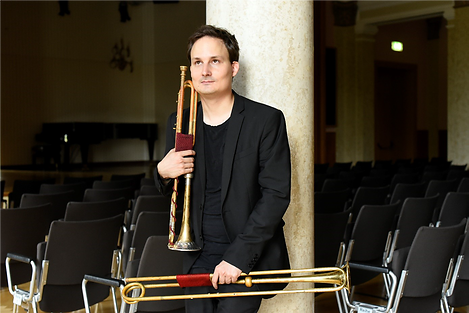 Andreas Ragger © Privat
Andreas Ragger © Privat
Andreas Ragger (*1989) studierte Konzertfach Trompete bei Prof. Josef Pomberger an der mdw und bei Prof. Wolfgang Bauer an der Musikhochschule Stuttgart. Weiters studierte er Jazztrompete bei Scott Wendholt am City College of New York. Von 2020 bis 2021 war er als Dozent an der Gustav Mahler Privatuniversität für Musik tätig und ist dort seither am Forschungsservice angestellt.
Das Thema seines PhDs an der mdw ist „Nikolai Kapustin - Rekonstruktion, Analyse und Kontextualisierung von Orchester- und Big Bandwerken von 1967 bis 1982“. Er ist als Herausgeber beim Schott Verlag gelistet (https://www.schott-music.com/de/aquarium-blues-no445954.html).
Preise: 1. Preis beim Wettbewerb für Interpretation von Barockmusik 2023 im Rahmen des Barockmusik Festivals in Holesov, 2 Publikumspreise (2018 und 2020) und der „Winner of the Austria Barock Akademie-Award 2018“.
Konzerttätigkeit und Bühnenerfahrung u.a. beim Znojmo Music Festival, dem Styriarte Baroque Music Festival, Tiroler Festspielen Erl, an der Wiener Staatsoper, im Wiener Musikverein, Wiener Konzerthaus, Radiokulturhaus Wien und im Minton´s Playhouse.
Website: https://andreasragger.com/
Abstract regarding the dissertation of Mag. art. Andreas Ragger
The musical oeuvre form of the Ukrainian born composer and pianist Nikolai Kapustin is characterized by a symbiosis of Western forms of composition and jazz idioms.
The main research question of this thesis is the attempt to analyze this amalgamation of classical composition techniques and stylistic elements of jazz in selected orchestra- and big band compositions of Nikolai Kapustin, based on existing notes publications and vinyl records. In order to work out this amalgamation as a distinctive composition technique regarding his 2nd Piano Concerto (op. 14) as well as five additional compositions (op. 12, op. 20, op. 26a, op. 34 and op. 35), which so far have only existed in form of vinyl recordings, these five works have to be transcribed first. In collaboration with the Schott publishing house, it is possible to finally publish the reconstructed compositions. My transcription of Kapustin´s “Aquarium Blues” for trumpet and big band (op. 12, 1967) has already appeared (please refer to: Aquarium Blues (schott-music.com)).
The analytical approach regarding the aforementioned compositions is to be of harmonical, rhythmical, formal and motivic-thematic nature. On the one hand the classical form-, harmony- and instrumentation theory serve as methodical approaches, on the other hand the harmony-, rhythm- and arrangement theory of jazz are applicable. In the course of the contextualization of the aforementioned works, this dissertation aims at shedding light on the historical connections regarding historical conditions, which are explained in detail through interrogative formulations with regard to history and music history. The 17 dissertations available so far, with one exception, relate to Kapustin´s piano - oeuvre. Therefore, the aim of this dissertation project is to fill this research gap concerning the orchestra- and big band compositions of Nikolai Kapustin. The gain for musicology is not only the re-establishment and the dissemination of lost sheet music, but also the objective of generating new knowledge with reference to the stylistic analysis of these works. Further both the historical context and the symbiosis of jazz and classical music will be investigated in this thesis.